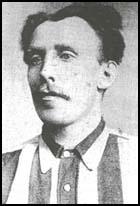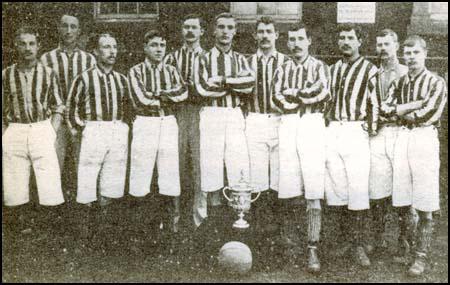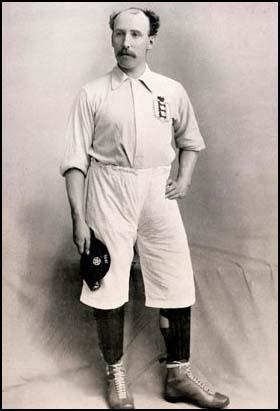Jack (Baldy) Reynolds

John (Jack) Reynolds was born in Blackburn on 21st February, 1869. He played local football for Park Road and Wilton before joining Blackburn Rovers. However, he failed to make the first team and returned to non-league football with Park Road.
In 1886 Reynolds joined the British Army and as a member of the East Lancashire Regiment was posted to Ireland where he played for the regimental team. In the 1887-88 season he played Distillery. He was such a talented player that the club paid for him to leave the army.
Despite being born in Blackburn, in 1890 Reynolds was selected to play for Ireland against Wales. On 15th March, 1890, Reynolds scored Ireland's only goal in their 9-1 defeat against England.
In 1891 Reynolds joined Ulster where he won an Irish Cup runner-up medal after losing to Linfield in the final. That season he played in all three of Ireland's games against Wales (7-2), England (1-6) and Scotland (1-2).
In 1891 Reynolds joined West Bromwich Albion. The club struggled in the Football League in the 1891-92 season. However, they did enjoy a 12-0 victory over Darwen. It is still the record score of a match played in the First Division of the Football League. Goalscorers that day included Tom Pearson (4), Billy Bassett (3) and Reynolds (2).
WBA had another good run in the FA Cup beating Old Westminsters (3-2), Blackburn Rovers (3-1), Sheffield Wednesday (2-1), Nottingham Forest (6-2) to reach the final against Aston Villa. In his book, Association Football in Victorian England, Philip Gibbons argues that: "Villa dominated the early proceedings, with Athersmith and John Devey exerting pressure on the Albion fullbacks. However, the West Bromwich side soon responded as Billy Bassett passed to Roddy McLeod, who crossed the ball to the waiting Geddes. He shot towards the Villa goal and Warner failed to collect the ball clearly. It rolled between the Villa goalposts to secure a surprising one-goal lead for the Albion team."
Billy Bassett was also involved in WBA's second goal. He won the ball on the halfway line and after running at the Aston Villa defence he passed to Alf Geddes. His shot was saved but the goalkeeper could not hold onto the ball and Sammy Nicholls had the simple task of scoring from the rebound. Jack Reynolds scored the third with a shot from 25-yards. Reynolds therefore won a cup-winners' medal in his first season at WBA.

Mark Nicholson, Jack Reynolds, Roddy McLeod, Joe Reader, Sammy Nicholls,
Charlie Perry, Tom Pearson, Willie Groves, Alf Geddes, Thomas McCulloch.
Jack (Baldy) Reynolds won his first international cap for England on 2nd April, 1892. Only one other player, E. E. Evans, has been known to play for two of the home countries. England beat Scotland 4-1. The England team that day also included Bob Holmes, Billy Bassett, Edgar Chadwick, John Goodall, Johnny Holt and Jack Southworth.
Over the next five years he won another seven caps for England. This included victories over Scotland (5-2 and 3-0) and Wales (6-0 and 4-0). Overall he scored three goals in eight games for his country. He is also the only player, barring own goals, to score for and against England.

Reynolds played 20 games for West Bromwich Albion in the 1892-93 season. The following year Reynolds and Willie Groves joined local rivals Aston Villa. WBA was furious about what they considered to be the poaching of two of their best players. WBA appealed to the Football Association and Villa was eventually fined £25 for approaching Reynolds and Groves without the consent of WBA. They were also forced to pay £50 for the transfer of Reynolds.
In the 1894-95 season Aston Villa had victories over Derby County (2-1), Derby County (7-1), Nottingham Forest (6-2), Sunderland (2-1) to reach the FA Cup Final against West Bromwich Albion. The Villa striker, John Devey, scored the only goal of the game after 39 seconds.
Reynolds was a member of the Aston Villa team that won the First Division championship in the 1895-96 and 1896-97 seasons. He also won his third cup winners' medal when Villa beat Everton 3-2 in 1897. Tony Matthews described Reynolds in his book, Who's Who of Aston Villa as "a marvellously competitive player, Reynolds mastered every trick in the book and, aided by some remarkable ball skills, his footwork was, at times, exceptionally brilliant."
A contemporary newspaper described Reynolds as: "A remarkably smart half-back. For his inches a perfect wonder. Knew every trick of the trade, and usually showed up well in big matches. Had a happy knack of scoring at critical moments."
After leaving Aston Villa in 1896 Reynolds played for Stockport County. Reynolds also had a reputation as a womaniser and as a heavy drinker. In 1899 he appeared in court in 1899 for non-payment of maintenance for an illegitimate child.
Reynolds also coached Grafton in New Zealand (1902-03) and Cardiff City (1907-08). He subsequently became a coalminer near Sheffield.
Jack Reynolds died in poverty in a boarding-house in Sheffield on 12th March 1917.
Primary Sources
(1) The Villa News and Record (1st September, 1906)
Jack Reynolds is a remarkably smart half-back. For his inches a perfect wonder. Knew every "trick of the trade", and usually showed up well in big matches. Had a happy knack of scoring at critical moments. Something of a roamer, he had the unique distinction of representing both Ireland and England in International matches. Had an eye to the humorous side of football.
(2) Tony Matthews, Who's Who of Aston Villa (2004)
A marvellously competitive player, Reynolds mastered every trick in the book and, aided by some remarkable ball skills, his footwork was, at times, exceptionally brilliant.
